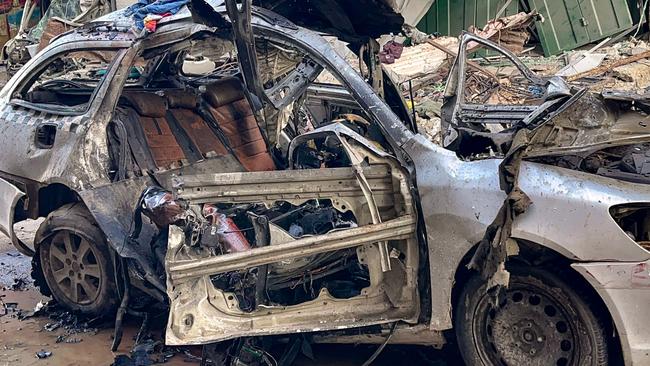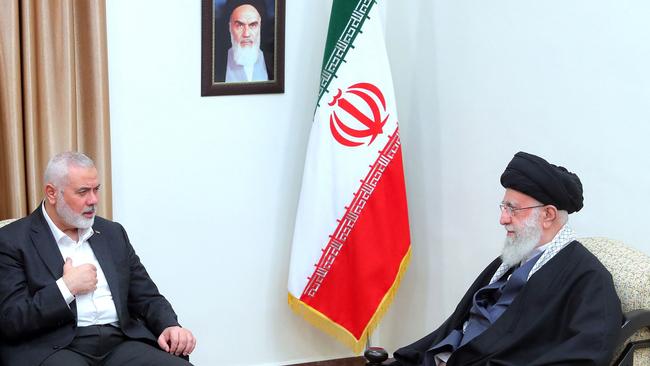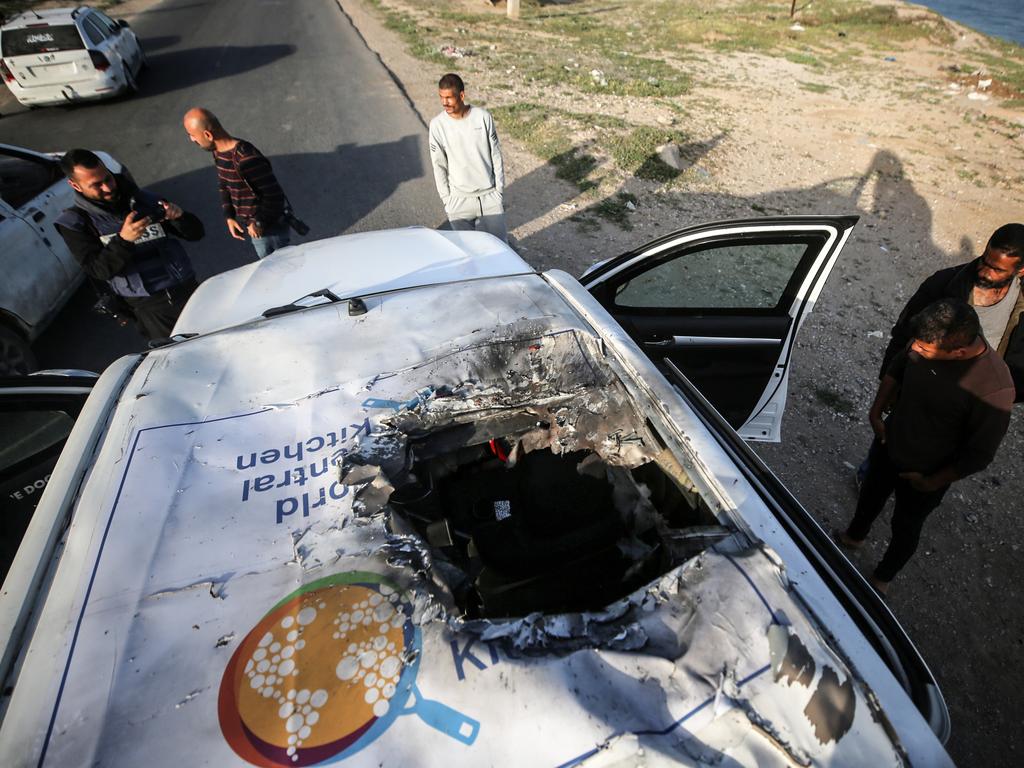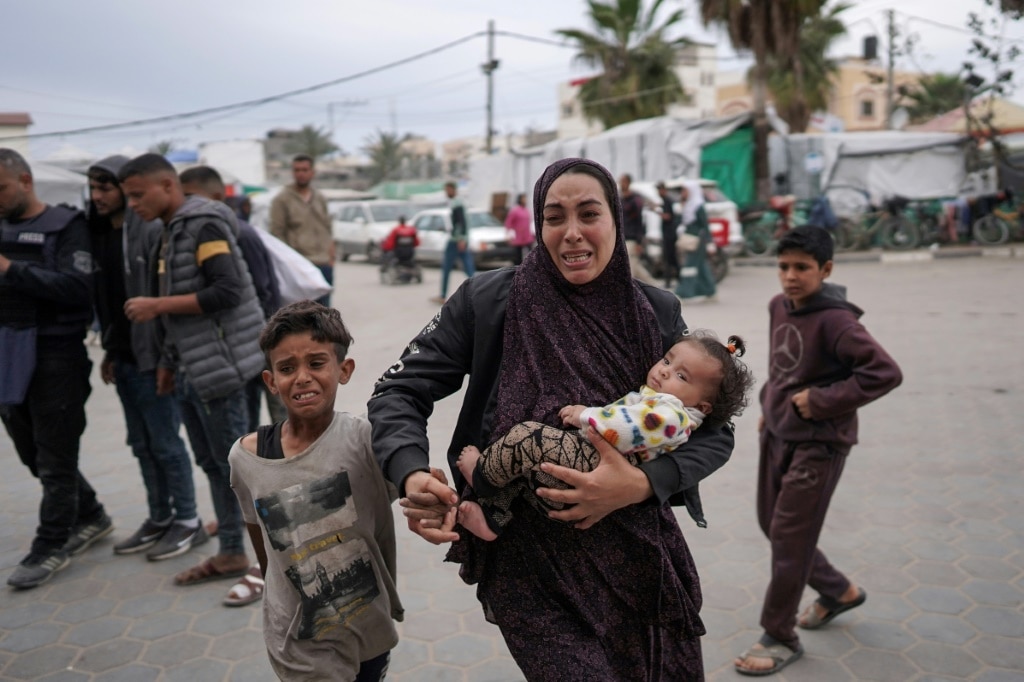Israeli strike kills Hamas leader Ismail Haniyeh’s sons in Gaza
The killing of Ismail Haniyeh’s sons on a Muslim holiday could cause greater diplomatic pressure on Israel as it negotiates the terms of a temporary ceasefire with Hamas.

Israeli airstrikes killed three adult sons of the head of Hamas’s political leadership on Wednesday, the first day of the Muslim holiday of Eid-al-Fitr, an attack that could complicate a U.S.-led plan for a ceasefire in the six-month-old conflict in Gaza.
Israel said its warplanes struck three sons of Ismail Haniyeh in Gaza because they were members of Hamas’s military wing. Hamas said five people died in the strike, which the group said hit a car making social visits for Eid, the holiday marking the end of the holy month of Ramadan.
Haniyeh, whose political bureau shares power with a military wing in Gaza, said some of his grandchildren also died.
“I thank God for this honour that he bestowed upon us with the martyrdom of my three sons and some grandchildren,” Haniyeh said in a video statement posted on X by Qatar-based broadcaster Al Jazeera.
Israel and Hamas named the three sons as Hazem Ismail Haniyeh, Amir Ismail Haniyeh and Muhammad Ismail Haniyeh. Hamas officials denied they were members of Hamas. Haniyeh, who is based in the Qatari capital Doha, has 10 other children, these officials said.
The killing of Haniyeh’s sons on a Muslim holiday could cause greater diplomatic pressure on Israel, which is negotiating the terms of a temporary ceasefire with Hamas. The group has largely rejected the U.S. plan, mediators said earlier Wednesday. Hamas said it would instead put forward its own road map for a permanent end to the war with Israel.
The dismissal illustrates the wide disagreement between the two parties on the contours of a deal and reflects Hamas’s growing confidence that diplomatic and domestic pressure on Israel to end the war gives the U.S.-designated terrorist group the upper hand in negotiations.

Hamas is seeking a permanent ceasefire and the full withdrawal of Israeli soldiers from Gaza in return for the release of hostages held in the strip. Israel has expressed openness to negotiating on the U.S. proposal for a temporary truce but wants the option of continuing its military campaign afterward.
It is unclear whether the deaths will significantly change the dynamics of negotiations between Israel and Hamas because decision-making over the war has been more narrowly focused on the Hamas leader in Gaza, Yahya Sinwar, and the group’s military wing.
Haniyeh heads Hamas’s Doha-based political leadership, a group that is normally made up of roughly 15 people at any one time and determines Hamas’s military and political direction via consensus.
Haniyeh said the deaths of his sons wouldn’t affect the group’s negotiating positions. “The enemy is delusional if it thinks that by killing my sons, we will change our positions,” he said in a statement posted on Hamas’s Telegram account.
The U.S. plan for a ceasefire, presented by Central Intelligence Agency Director William Burns to officials from Israel, Hamas, Qatar and Egypt in Cairo, calls for a six-week ceasefire in Gaza. During the pause in fighting, Hamas would release 40 of the hostages the group is holding in the enclave in exchange for 900 Palestinian prisoners from Israel’s jails, including 100 serving long sentences on terrorism-related charges, the plan said. Many of the 133 hostages held in Gaza are believed dead.
Israel’s war cabinet – made up of Prime Minister Benjamin Netanyahu, Defense Minister Yoav Gallant and a former head of the Israeli military, Benny Gantz – met Tuesday evening to discuss the U.S. proposal, before they then talked it through with a broader group of ministers.
A senior Israeli official familiar with the negotiations said Wednesday morning that Israel was open to using the U.S. proposal as a basis for talks, but that the plan is seen as favouring Hamas. Israeli officials view the proposal’s plan for the return of Palestinian civilians to northern Gaza and the ratio of prisoners to hostages as major concessions.
But there is a majority in the government that would vote to ratify a deal, even if it involves tough concessions on Israel’s part, the official said. If Hamas provides a counter-proposal that moves negotiations forward, the two sides would be able to enter into serious negotiations, the official said.
Hamas officials told mediators in discussions this week in Cairo that their main issue with the U.S. plan was that it made no reference to an end to the war. They said that they would put forward their own proposal later this week, based on an earlier proposal.
Under that plan, Hamas said it would release hostages who were women, children and elderly in return for the release of some Palestinians in Israeli jails, the withdrawal of Israeli soldiers from parts of Gaza, the increased entry of aid and the return of free movement of Palestinians around the strip.
In a second phase of this deal, Hamas would release other hostages in return for a full Israeli withdrawal from the strip. In a final step, Hamas wants Gaza to be reconstructed and the U.S., United Nations and other countries to act as guarantors of the agreement and the permanent end of the conflict.
Israel has said it is open to negotiating on these points but wants to avoid free movement of Gazans before a permanent end in fighting to stop Hamas from regrouping in areas where Israel has already routed the group.
Israel has now significantly reduced its troop presence inside Gaza. Israeli troops have pulled out of the southern Gaza city of Khan Younis and largely withdrawn from populated areas, the military said, though troops are still located in strategic axis points between southern and northern Gaza and deployed along the periphery of the enclave. Analysts say only one Israeli brigade remains within the strip, down from a peak of more than 60,000 troops at the height of operations last year.
Israel launched its military campaign in Gaza after a Hamas attack on Oct. 7 that Israeli officials say killed some 1,200 people in Israel, most of them civilians. More than 33,000 Palestinians, most of them women and children, have been killed since the Israeli offensive began, according to Palestinian health officials, whose figures don’t distinguish between combatants and civilians.
Israel is under pressure from the U.S. and other allies to wrap up its military campaign and ease a deepening humanitarian crisis in the enclave. Calls for a ceasefire have increased since the Israeli military hit an aid convoy last week, killing seven humanitarian workers. Israel said the military wrongly identified the aid workers’ cars as hostile targets and that its troops lacked the evidence to order the strikes.
Netanyahu and other Israeli officials have said their military should mount a final operation in the southern Gazan city of Rafah to take out the last Hamas battalions operating there. “This will happen; there is a date,” the prime minister said on Monday.
Some political analysts interpreted that statement as a move to put pressure on Hamas to make concessions this week in the ceasefire talks.
The U.S. has said a ground incursion of Rafah without steps to safeguard the more than a million civilians sheltering there is misguided. U.S. officials are expected to meet early next week with their Israeli counterparts to discuss Israel’s plans.
Far-right members of Netanyahu’s government have threatened to leave his fragile coalition – which would cause its collapse – should the military scrap its plans to push into Rafah.
Sinwar, the Hamas leader in Gaza, has become increasingly forthright, meanwhile, in pushing for a deal that includes a permanent end to fighting. Sinwar and Hamas officials want to ensure the group’s survival and envision a role for it in governing Gaza after the war – an idea that Israel rejects.
Hamas is using “asymmetric diplomacy,” said Tahani Mustafa, an analyst at International Crisis Group, a think tank. “You basically hold out as long as you can until Israel gets desperate enough that it will have to eventually concede,” she said.
Under U.S. pressure, Israel in recent days has increased the level of aid flowing into Gaza to ease a hunger crisis there. The Israeli military’s humanitarian co-ordination unit said Wednesday that about 400 trucks a day had entered the strip in the past few days. That compares with a daily average of roughly 121 trucks during the war, according to a U.N. tracker. Before the war, Gaza received about 600 trucks of commercial goods and aid a day.
Hamas is also watching tensions heighten between Iran, its backer, and Israel. Israeli officials believe Hamas launched its Oct. 7 attack partly hoping it would spark a regional conflict that would include Iran and its Lebanese ally Hezbollah.
Tehran and Hezbollah have instead offered limited military support, but tensions between Israel and Iran have been rising after airstrikes on a diplomatic building in Syria killed top Iranian military commanders, again threatening to expand the war beyond Gaza.
Iran’s Supreme Leader Ayatollah Ali Khamenei said Wednesday on X that the strikes in Syria constituted an attack on Iranian soil and that Israel “should be punished, and it will be punished.” Israeli Foreign Minister Israel Katz responded that if Iran attacks Israel from Iranian soil, Israel would retaliate inside Iran.
Dow Jones







To join the conversation, please log in. Don't have an account? Register
Join the conversation, you are commenting as Logout